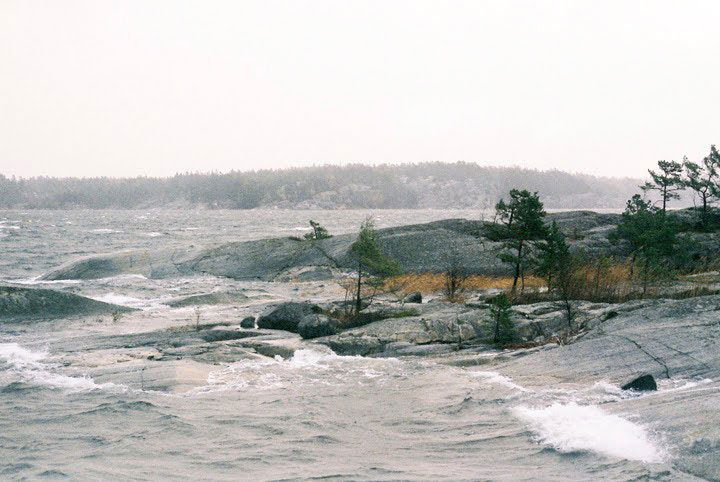The Anchorage, a stark, bold, almost abusively demanding experimental drama by Cal Arts grad C.W. Winter and acclaimed Swedish photographer Anders Edstrom, defies all established rules of traditional cinema and carves out its own unique and inimitable onscreen vision. As a result, the co-directors craft a remarkable viewing experience virtually unlike any other.
The story, which takes place in Northern Sweden during the autumn months, involves a middle-aged widow named Ulla (Ulla Edstrom), inhabiting a rural homestead embanked by ocean. Each morning, she ventures down to the shore, disrobes, plunges into the icy water, and slips back into her clothes. Her adult children visit, then leave. Then, one evening, the unexpected occurs: a hunter in day-glo colors passes a little too closely to the house; Ulla’s dog begins to whine. In the days that follow, she notices an unmoored boat parked nearby, seemingly occupied by the same man. Thus, she begins to feel increasingly unsettled.
This is a minimalist work, but that categorization doesn’t begin to hint at how challenging the material is. Gone is the standard movie exposition – we can’t even conclude that Ulla is a widow without reading the production notes – and gone are the standard desires and conflicts of conventional drama. Gone, even, is any narrative momentum per se – so that although this movie nominally has a conceit similar to that of Diego Vignatti’s 2007 minimalist drama Tides (a lonely woman making her daily pilgrimage to the water) , the similarities end there; The Anchorage makes Vignatti’s work seem lightning paced.
That isn’t necessarily a criticism, however; Winter and Edstrom’s goals lie elsewhere. Their desire involves achieving and sustaining a cinematographic and emotional stasis – evoking a pure state of being onscreen. In this regard, the film recalls Alain Tanner’s masterful 1983 picture Dans la Ville Blanche. Yet to be even more specific, the emotions that materialize in The Anchorage are as different from Ville blanche as night and day, and make this film a thoroughly singular beast.
Here , the primary feeling that emerges from the images is one of dread. It remains unclear throughout the picture if the hunter is benign or malignant, and if he will turn up again, but that scarcely matters; his enigmatic presence escalates Ulla’s anxiety to a boiling point and ours along with it. Each time an interior shot of the house appears onscreen, with the exteriors illuminated through the panes of glass, we feel a nauseating sense of fear that the stranger will suddenly pass by, or peer into the window before us. What makes this suspense particularly effective is the fact that it surpasses standard cinematic tautness in its philosophical depth. Within the context of this particular story ,we never merely get empty movie tension, but rather, tension as a metaphor for a single middle-aged woman’s haunted inner life. This is driven home by one of the film’s few medium shots, as Ulla stands in her bathroom, of her lonely, distraught and emotionally-shattered face. Ulla is not a happy or well-adjusted character, and despite the orderliness of her external self-made world, her emotional state is anything but. As we linger inside the empty, still house, anticipating an eerie glimpse of the passerby in the distance, the vulnerability that is a product of the woman’s solitude becomes not only palpable for us but raw and then truly uncomfortable – evoking thoughts of the millions of older single women who have spoken of the horror associated with physical, emotional, and geographic isolation. Thus, the movie – for reasons that have absolutely nothing to do with its pace – grows challenging to watch; we may find ourselves recoiling from the screen, so overwhelming is the dread. But in this regard, the film is an unmitigated success.
For all of the reasons described here, The Anchorage sits about as far away from conventional Hollywood filmmaking as anything in memory. As a viewer, embracing such extremism means abandoning all presuppositions about the fundamentals of narrative, and adjusting one’s own perspective beyond the myopic boundaries to which it may be conditioned. Those able to do so will discover that the movie rewards them immeasurably.

